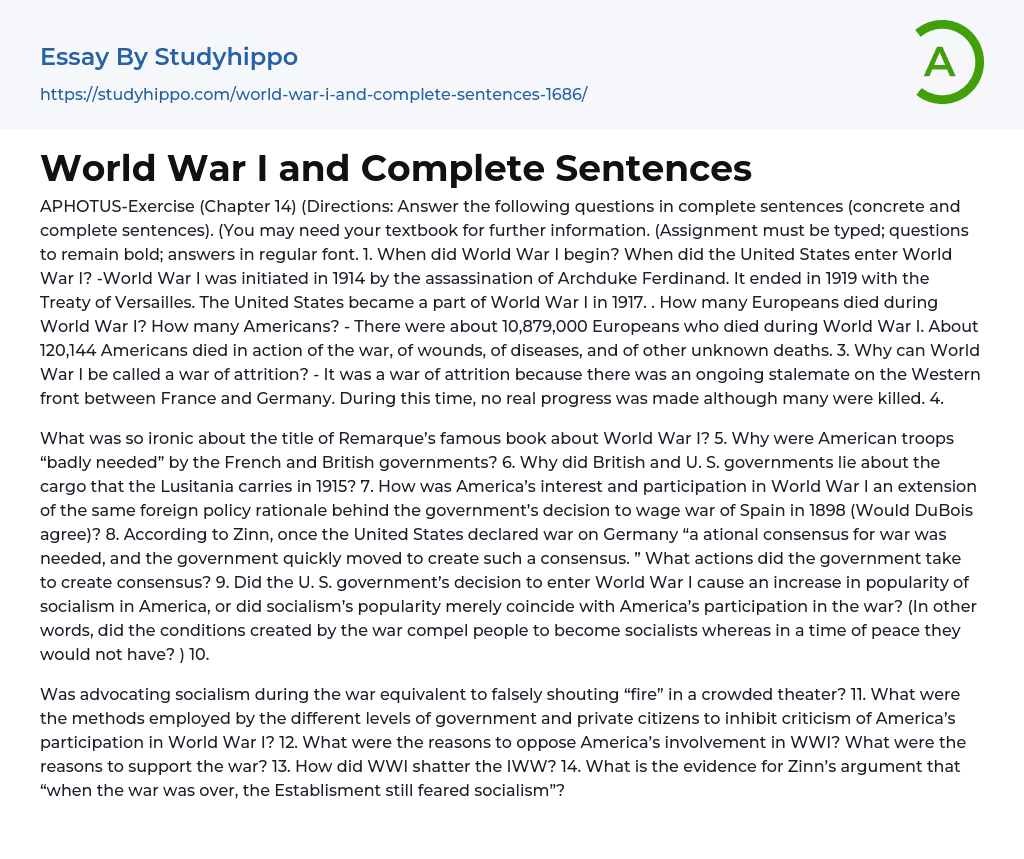APHOTUS-Exercise (Chapter 14) (Directions: Answer the following questions in complete sentences (concrete and complete sentences). (You may need your textbook for further information. (Assignment must be typed; questions to remain bold; answers in regular font.
1. When did World War I begin? When did the United States enter World War I? -World War I was initiated in 1914 by the assassination of Archduke Ferdinand. It ended in 1919 with the Treaty of Versailles. The United States became a part of World War I in 1917.
2. How many Europeans died during World War I? How many Americans? - There were about 10,879,000 Europeans who died during World War I. About 120,144 Americans died in action of the war, of wounds, of diseases, and of other unknown deaths.
3. Why can World War I be called a war of attrition? - It was a war of
...attrition because there was an ongoing stalemate on the Western front between France and Germany. During this time, no real progress was made although many were killed.
4.What was so ironic about the title of Remarque’s famous book about World War I?
5. Why were American troops “badly needed” by the French and British governments?
6. Why did British and U. S. governments lie about the cargo that the Lusitania carries in 1915?
7. How was America’s interest and participation in World War I an extension of the same foreign policy rationale behind the government’s decision to wage war of Spain in 1898 (Would DuBois agree)?
8. According to Zinn, once the United States declared war on Germany “a ational consensus for war was needed, and the government quickly moved to create such a consensus. ” What action
did the government take to create consensus?
9. Did the U. S. government’s decision to enter World War I cause an increase in popularity of socialism in America, or did socialism’s popularity merely coincide with America’s participation in the war? (In other words, did the conditions created by the war compel people to become socialists whereas in a time of peace they would not have? )
10.Was advocating socialism during the war equivalent to falsely shouting “fire” in a crowded theater?
11. What were the methods employed by the different levels of government and private citizens to inhibit criticism of America’s participation in World War I?
12. What were the reasons to oppose America’s involvement in WWI? What were the reasons to support the war?
13. How did WWI shatter the IWW?
14. What is the evidence for Zinn’s argument that “when the war was over, the Establisment still feared socialism”?
- League Of Nations essays
- Battle Of The Somme essays
- Treaty Of Versailles essays
- Activism essays
- Communism essays
- Conservatism essays
- Liberalism essays
- Marxism essays
- Nationalism essays
- Patriotism essays
- Policy essays
- Public Policy essays
- Social Contract essays
- Socialism essays
- Totalitarianism essays
- American Civil War essays
- Atomic Bomb essays
- Attack essays
- Cold War essays
- Crimean War essays
- Diplomacy essays
- Emilio Aguinaldo essays
- Emperor essays
- Hitler essays
- Iraq War essays
- Korean War essays
- Mexican American War essays
- Nazism essays
- Nuclear Weapon essays
- Philippine Revolution essays
- Revolutionary War essays
- Rwanda essays
- The Spanish American War essays
- Trench Warfare essays
- Tribe essays
- Vietnam War essays
- War of 1812 essays
- Western Front essays
- World War I essays
- World War Ii essays




